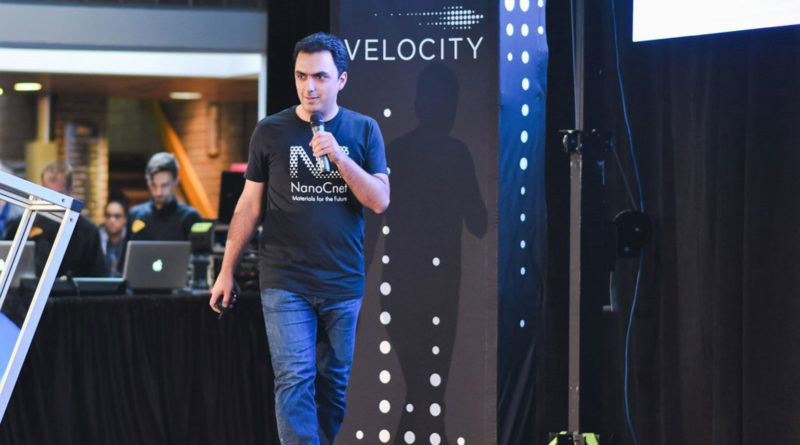Hadi Hosseinzadeh Khaligh – NanoCnet
A hundred people were watching as Hadi Hosseinzadeh Khaligh took the stage.
His challenge: to explain his materials science PhD thesis about silver nanowires and their deficiencies. To a general audience. In just three minutes.
He was participating in a competition called the Three Minute Thesis (also known as 3MT). “That was my first pitch,” he remembers. “I went with my passion about my research.”
Since then, he’s pitched many more times, but in a completely different way. Instead of a general audience, he’s talking to investors and electronics manufacturers around the world. And instead of his thesis, he’s talking about NanoCnet, a Velocity Fund-winning company with a new way of manufacturing conductive materials and film – “using them as the coat to make transparent surfaces like glass and plastic conductive,” he explains.
It all ties back to his PhD research, though, and the work cofounder Ehsan Mazbanrad was doing with silver nanoparticles. “We knew that the materials we have right now are expensive, some of them are not flexible, or they degrade fast. All of these problems limit the performance of future devices,” says Hadi.
“So we synthesized a new material. We changed the process fundamentally to make a new kind of silver nanoparticles . . . We introduced a new generation.”
But starting a company wasn’t always his goal. He talks passionately about his love for education, and originally planned to stay in academia after finishing his PhD, as a professor. (Ehsan planned to do the same, too.)
During his undergraduate program in material science at the University of Tehran, he also taught physics. When he came to the University of Waterloo for his masters in electrical engineering, he became an active TA – even winning an award for his efforts in his final year. When he was completing his PhD, he spent two semesters as a sessional lecturer teaching first and second year physics courses.
That was on top of his own research for his degrees.
During his first year as a master’s candidate, Hadi met a professor on campus who specialized in materials science. He reached out. “I started as her first student, and we started with an empty lab,” he says.
Starting from scratch proved to be a challenge in some unexpected, but satisfying, ways. Not only did he know he’d have to push himself harder in his studies, but he learned how to network and hustle for lab equipment and time to get his research done – something not many folks in academia get to experience.
The Three Minute Thesis was another break from traditional academic life. “I think the graduate students in master’s and PhD are not really interested, or they don’t feel that, if they go and talk to a general audience, they can explain what they do,” he says. “So it was really good challenge, that I could explain my research in three minutes in a way that everyone understands.”
The decision to start a business came when the two cofounders were discussing their research.
Hadi was focused on the deficiencies of the materials we have today, while Ehsan was working on synthesizing new ones. “We ended up thinking, we could work together to solve the problem.”
Stepping away from academia, the pair have had to think about their approach in a different way. “When you are in a research environment, you only think about research,” he says. “I learned that you need to focus on what you have, and the problem you’re solving, what you’re selling, the market.
“In research, sometimes, we don’t really know if it’s scalable, or even how important it is for the industry. We do research because we are interested in that area.”
While they’re experts in the materials and manufacturing process they’re working with, turning it into a business was something they didn’t get in their classroom experience. For that, Hadi says they turned to local support from professors, the Accelerator Centre, and Velocity Garage.
At first it was a challenge. There were lots of terms and strategies that were new. But it wasn’t entirely unfamiliar. Remember when he had to find access to lab space for his research?
“Since I got used to talking to people from different areas and other research groups, I think it was less challenging because I had this experience talking to people and getting their advice,” he says.
And the most important thing: he truly wanted to learn. “When you need to learn something, you learn it much faster than when you think that you should go to class and maybe you want to learn it,” he says. “I felt that way, that I need it, so I put myself in a position to push myself to learn all these things.”
It was the same way Hadi pushed himself to give that Three Minute Thesis. And for those counting, he did indeed take home a $1,000 prize – but got so much more in return by learning to pitch.
“The good part of it, after you’re done, you get some good feedback,” he says. “It doesn’t necessarily mean that you get the $25,000 or $10,000 or whatever, but if you got good feedback and you feel that people understand your work, you feel pretty confident about telling the story and talking to other people in the business world.”
Learn more at:
https://nanocnet.com/

